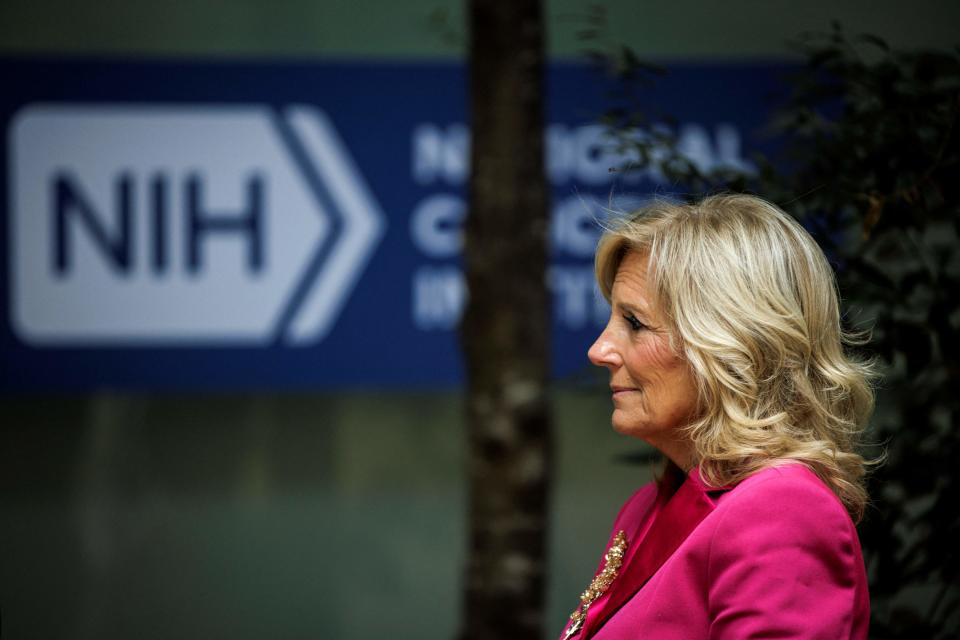Why can't women get better care for menopause or heart attacks? Jill Biden wants answers
- Oops!Something went wrong.Please try again later.
- Oops!Something went wrong.Please try again later.
Washington − Women aren't getting the care they need when it comes to menopause, heart attacks and other health issues, according to the Biden administration. Now, first lady Jill Biden is giving the administration 45 days to amp up efforts to change that.
Officials said they’re trying to correct the fact that women have been understudied and underrepresented in health research, despite making up more than half the population.
“If you ask any woman in America about her health care, she probably has a story to tell. You know her. She's a woman who gets debilitating migraines but doesn't know why and can't find treatment options that work for her,” the first lady told reporters Monday. “She's the woman going through menopause, who visits with her doctor and leaves with more questions than answers.”
The new initiative announced Monday will be led by Dr. Carolyn M. Mazure, who recently joined Biden’s office from the Yale School of Medicine. At Yale, Mazure created an interdisciplinary research center on the health of women, which studies topics ranging from cardiovascular disease to cancers.
The effort will prioritize areas of research where additional investments could make a big difference, such as heart attacks in women and menopause.
A first step is coming up with specific actions the administration can take to improve research. Officials said they will identify those actions within 45 days.
"I didn't realize how much incongruity there was and how imbalanced it was," President Joe Biden said when he signed a memo establishing the initiative. "So, God willing, we’re going to solve that."

Gaps in women's health research
The National Institutes of Health already has an Office of Research on Women’s Health, created in 1990 because women were not being consistently included in NIH-support research.
Since then, the NIH says, it’s achieved significant progress. Policies were created to ensure women are included in research. Research into women’s health has increased. New programs were created to prepare researchers to study women’s health.
But information gaps are still too big, officials said.
“Doctors don't have the information they need, in particular to treat women in their 50’s, 60’s, 70’s and beyond,” said Maria Shriver, a former first lady of California who raised the issue with Jill Biden earlier this year and joined her for Monday’s announcement. “And that's largely because doctors don't have the research data that can dictate their care.”
The initiative goes beyond the NIH by bringing in other federal agencies and partnering with philanthropies and research institutions.
What health conditions are more common in women?
Research published in 2021 showed a disproportionate share of NIH research funding went to diseases that affect primarily men at the expense of those that affect primarily women.
Officials cited various examples of research gaps including:
Women make up two-thirds of the cases of Alzheimer’s but only 12% of NIH funding for Alzheimer’s and related dementias goes towards research focused on women.
Heart disease is the leading cause of death among women yet traditional testing used to diagnose a heart attack was developed based on men.
Researchers don’t know why women who never smoked are twice as likely to develop lung cancer than men who never smoked.
Women suffer from depression and anxiety at twice the rate as men.
Millions of women go through menopause each year, and yet, Jill Biden said, “there's a stunning lack of information about how to manage and treat its symptoms, which can be debilitating.”
What is menopause?
Menopause is defined as the time that marks the end of your menstrual cycles. Most physicians will diagnose it once the individual has gone 12 months without a menstrual period.
Menopause often receives little attention during women’s visits with doctors, according to the health research organization KFF.
Just over one-third of women ages 40-64 surveyed by KFF last year said their health care provider ever talked to them about what to expect in menopause.
“They do not have the answers that they deserve,” Shriver said. “The bottom line is that we can't treat women or prevent them from becoming sick in the first place, if we have not invested in funding the necessary research.”
Is there treatment for menopause?
In the years and months leading up to menopause, known as perimenopause, some of the symptoms include irregular periods, hot flashes, sleep changes, weight gain, thinning of hair and dry skin among others.
According to the Mayo Clinic, while no treatment exists for menopause, most of the focus is working to alleviate symptoms that might become chronic. Some of these include hormone therapy, low-dose antidepressants and various medications to manage hot flashes.
This article originally appeared on USA TODAY: Jill Biden to improve research on women's health issues like menopause

